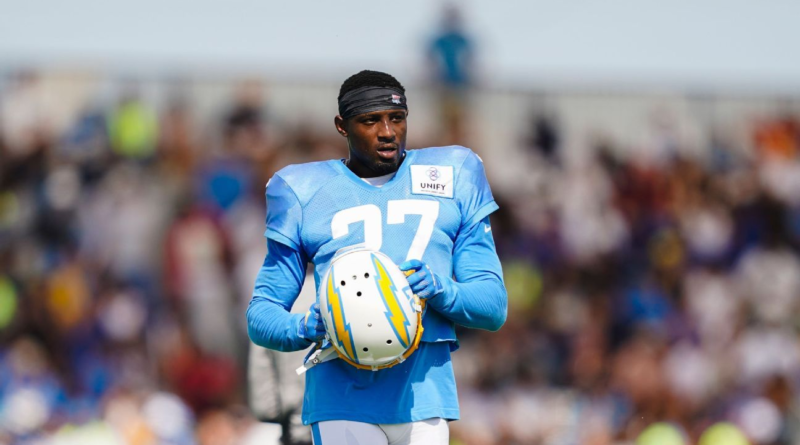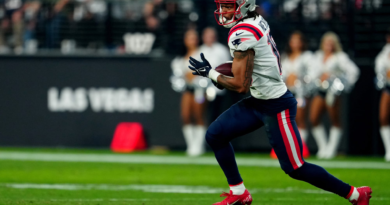Why the Chargers traded J.C. Jackson one season after an $82.5 million deal
AS THE DEFENSIVE backs meeting was ending, Los Angeles Chargers general manager Tom Telesco walked to the front of the room.
It was Week 6, the group’s first meeting since the Chargers traded cornerback J.C. Jackson to the New England Patriots for a swap of late-round picks, just over a year after signing him to a five-year $82.5 million contract in March of 2022. Telesco stood in front of the group and began to apologize.
Telesco told the group that signing Jackson was a mistake, according to multiple team sources. He apologized for continuing to give Jackson opportunities, despite Jackson routinely showing that he wasn’t as committed as the rest of the team while being one of the Chargers’ highest paid players.
Telesco called the move a “swing and a miss.”
The apology was a shocking admission, but Telesco’s points weren’t a secret in the organization. Jackson struggled to be the player the Chargers thought they were getting after his four seasons in New England, which included a second-team All-Pro selection. In two seasons in Los Angeles, Jackson played seven games. He missed 14 of 22 games due to injuries and was benched in his final two games as a Charger.
When he did play, Jackson’s stats were among the worst in his career, with highs in passer rating while targeted and yards allowed per completion.
“I’m still confused on why, but like I said, I can’t put my opinion on it. It was the coach’s decision,” Jackson said after he was benched for the Week 3 matchup against the Minnesota Vikings. “I can tell you I’m confused. I don’t know what’s going on, but that’s not the real answer of why I didn’t play last week or why I didn’t start. That’s above me.”
Many within the organization believed Jackson approached practices with a “lackadaisical” attitude and didn’t respond well to coaching, according to team sources. In the Chargers’ Week 4 game against the Las Vegas Raiders, Jackson refused to go in after he was benched for the first three quarters, telling coaches he wasn’t warmed up enough, according to team sources.
In that same game, quarterback Justin Herbert played with a fractured left middle finger, an injury in which Herbert’s bone punctured his skin. Herbert didn’t miss any snaps. The juxtaposition of those moments was the final straw for the Chargers, according to team sources.
They traded Jackson and a 2025 seventh-round pick for a 2025 sixth-round pick from the Patriots. Ultimately, the Chargers paid Jackson $38.5 million for seven games over two seasons. Entering their “Monday Night Football” matchup against the New York Jets (8:20 p.m. ET, ESPN), the Chargers are allowing the most passing yards per game in the NFL (297.4).
“There’s a body of work to go off of — two years’ worth of a body of work,” coach Brandon Staley said after the trade. “We just felt like this was the best course for our team.”
When asked if “the body of work” Staley was referring to was specific to performance on the field or off the field, Staley was direct.
“In all ways.”
THE PATRIOTS SIGNED Jackson as an undrafted free agent out of Maryland in 2018, and he quickly developed into a starter and impact player, finishing second among all rookies in interceptions (3).
From there, Jackson emerged as one of the best players at his position with a knack for creating turnovers and excelling in press-man coverage. Over his four seasons with the Patriots, Jackson allowed a passer rating of 42.0 as the nearest defender in coverage, the best in the NFL among defensive backs with a minimum of 250 targets. Despite one interception since 2022, Jackson’s 26 interceptions since he entered the league are the most in that span.
“You leave any trash lying around, he’s going to pick it up,” Patriots coach Bill Belichick said of Jackson in 2021.
In his final year in New England, Jackson had the best season of his career. He finished second in the NFL with eight interceptions and was a second-team All-Pro.
When Jackson hit free agency, the Chargers made sense for many reasons. Jackson was 7-on-7 teammates with Chargers safety Derwin James in high school; Chargers wide receivers coach Chris Beatty was a coach at Maryland in 2016 when Jackson was there; former Chargers defensive coordinator Renaldo Hill and Derrick Ansley, who was then the Chargers defensive backs coach and is now defensive coordinator, recruited Jackson out of high school.
But the most obvious reason was that cornerback was arguably the defense’s most glaring need: Jackson’s interception total in 2021 was three less than the Chargers’ total (11) that season.
The team had stars elsewhere: Joey Bosa on the defensive line and James at safety. Jackson would give the Chargers a legitimate top cornerback who could shadow No. 1 receivers, and a star at every level of their defense.
In a video shared by the team, Staley told Jackson he liked the cornerback’s ability to shadow No. 1 receivers such as CeeDee Lamb of the Dallas Cowboys and Mike Evans of the Tampa Bay Buccaneers, among others.
“Durable. Young. Championship player. Must have this guy,” Staley said.
Still, for the Chargers, it wasn’t just that Jackson was a great player, but he appeared to fit the team’s culture.
“The big thing when you’re team building is there is a difference between collecting just good players,” Telesco said in the video, “and putting a team together that fits together and complements each other.”
Jackson’s deal, and specifically the $40 million in guaranteed money, was a clear indication that the Chargers believed Jackson would thrive in Los Angeles.
But that’s not how it worked out.
He elected to have ankle surgery in August of 2022, which was supposed to be a minor procedure to correct discomfort. The recovery kept him out of Week 1, and after playing Week 2, the ankle injury flared up again, and he was out for Week 3.
Four weeks later, Jackson ruptured the patellar tendon in his right knee and was out for the season. Over the five games Jackson did play, he allowed career highs in yards per completion (20.9), passing rating when targeted (149.3), and allowed four touchdowns, the second-most in his career.
Jackson spent the offseason rehabbing his knee injury in time to be ready for training camp in July and started in Week 1 of the 2023 season against the Miami Dolphins. Jackson got his first interception as a Charger, but he and the secondary largely struggled.
Jackson had a 30-yard pass interference penalty that set up a field goal for the Dolphins before halftime and allowed three catches for 99 yards and a touchdown as the nearest defender in coverage, according to Next Gen Stats.
The struggles continued in Week 2 against the Tennessee Titans, and Jackson was benched and traded just over a week later.
AFTER JACKSON AND the Chargers’ secondary struggled in two losses to open this season, Jackson was a healthy inactive in Week 3 against the Vikings. It was the first time Jackson had been inactive since his rookie season.
Staley downplayed the benching, saying he went with the “right group” for the game. But the moment signified how much Jackson had fallen out of the organization’s good graces. The Chargers were matching up with one of the league’s top receivers in Justin Jefferson, but their highest paid cornerback was on the sidelines healthy in a hooded sweatshirt and shorts.
Staley’s explanation was hard to understand but it may have had as much to do with Jackson’s issues off the field as it did with his struggling play.
Jackson had been approaching practice and meetings without a “sense of urgency,” team sources said. He didn’t respond well to Chargers defensive coaches who reprimanded him the same way they did others for missed assignments or calls, team sources said.
When the Chargers benched Jackson in Week 3, these habits only got worse, team sources said. Then, a day later, an arrest warrant for an unpaid speeding ticket was issued for Jackson in Massachusetts. Later that week, Jackson said the arrest warrant was resolved, that he was confused by his benching and was not 100% healthy.
The Chargers reversed course and made Jackson active for Week 4 against the Raiders, but Jackson stood on the sidelines for nearly three quarters until cornerback Michael Davis tweaked his ankle, and coaches called for Jackson to enter the game. But Jackson refused and stayed on the sideline with his shoes untied, citing that he wasn’t warm enough to play, team sources said. Jackson was traded four days later.
Still, not everyone in the organization had grown frustrated with Jackson. For cornerback Ja’Sir Taylor, Jackson was someone he could seek out to learn different coverage techniques, and he attributed Jackson’s hurdles to being in a new situation.
“It’s hard coming into a new place,” Taylor said. “He was in New England for four years, and any transition takes time, and it just took time for him to get rolling to learn the defense, to fit in with the guys. Everything is new for him, so I don’t fault him for anything. All the things that you hear, that’s not the J.C. I knew.”
But Taylor and other defensive backs said Jackson’s departure gave the group some clarity and relief, particularly for Davis, who is now the starter at outside cornerback.
Davis described the first four games as “a little bit shaky” for the defensive backs due to him and Jackson competing for the starting job each week.
“It was kind of just the unknown. Now that he’s not here, everybody knows their own role,” Davis said. “The roles are defined now, so to speak. The roles before weren’t defined for anybody. There were a lot of moving parts.”
With Jackson gone, the Chargers added cornerback Essang Bassey, who now wears Jackson’s 27 and occupies his old locker.
Jackson, meanwhile, said he was “happy” following his Oct. 8 debut with the Patriots.
“Just feels like home,” Jackson told reporters. “Good to be home. I feel appreciated here. I’m excited to be back.”
The Patriots kept Jackson on the sidelines for the opening two series in Sunday’s loss to the Washington Commanders. Patriots coach Bill Belichick said Jackson wasn’t benched, saying “everybody played.” Jackson declined to talk to reporters post-game.
In three games since Jackson’s departure, with Davis taking over as the starter, the Chargers’ struggles in the secondary have continued. The pass defense is one of this team’s most significant weaknesses. Two weeks ago, this group allowed Kansas City Chiefs quarterback Patrick Mahomes to throw for 321 yards in the first half, the second-most in a half in his career.
“Things just didn’t work out how we needed it to work out for both sides,” James said. “I feel like it was what was best for both sides. Like I’ve said, we wanted it to work. It just didn’t happen. That’s what happens in the NFL.”



